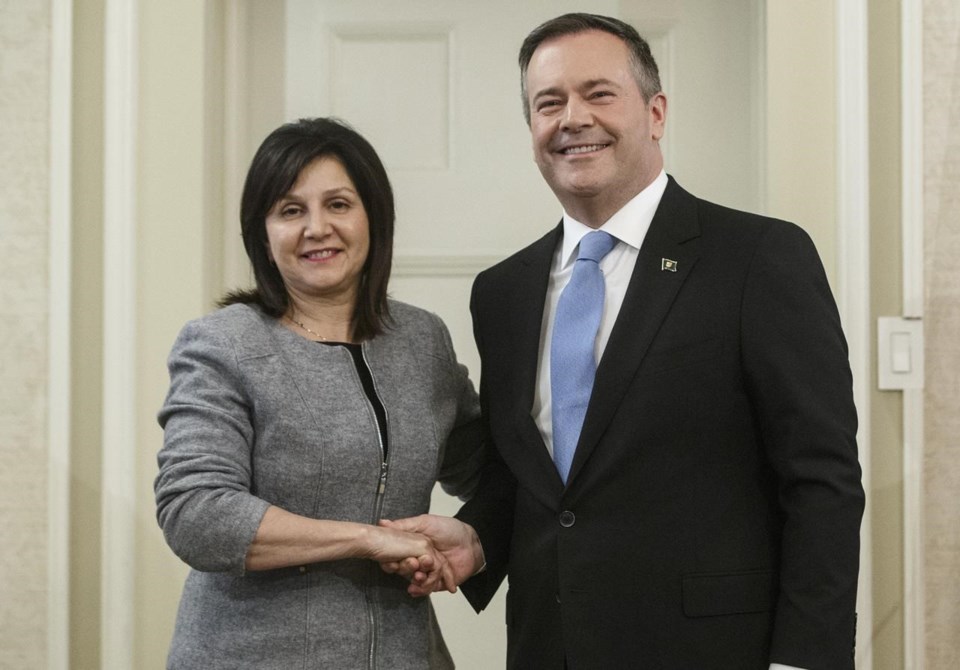EDMONTON — Alberta's proposed new curriculum for young students focuses on literacy, numeracy and practical skills including computer coding, budgets and public speaking.
The Opposition NDP says it fails, particularly in areas surrounding First Nations history and residential schools.
Education Minister Adriana LaGrange outlined the plan Monday for kindergarten to Grade 6 students. She said it applies to eight core subjects and reflects dominant themes and concerns expressed by parents.
"They told us they wanted to leave behind educational fads and unproven methods of discovery or inquiry learning," LaGrange told a news conference.
She noted some areas of the curriculum have not been updated for decades.
"The draft elementary curriculum renews our focus on teaching students essential knowledge and critical skills."
The overhaul stresses fundamentals such as spelling, phonetics, multiplication tables, how to research, think critically and weigh statements and arguments.
It teaches applied math through geometry and statistics along with life-skill applications such as creating a budget.
The proposal directs that students be introduced to world religions, Canada's history, and the contributions of First Nations, Metis and Inuit cultures — as well as the experiences of the Black and francophone communities.
The health and wellness part of the curriculum includes teaching students the importance of boundaries and consent.
"Early on, (students) will learn that personal boundaries can be communicated through words and actions. In later grades, they will learn more directly that sexual activity should never be forced or make individuals uncomfortable or threatened," said LaGrange.
Treaties and residential schools would not be taught until the later grades.
The former NDP government had begun restructuring the curriculum during its four-year term, but that was scrapped by LaGrange and the United Conservative government when it won power in the 2019 election.
Education critic Sarah Hoffman said the NDP-proposed curriculum also emphasized learning the basics and modern life-skill applications.
"That curriculum included computer science skills, financial literacy and consent," said Hoffman. "I'm relieved that this work has stayed in this draft of the curriculum."
But LaGrange has failed profoundly by not including First Nations history in earlier grades, Hoffman said.
"Adriana LaGrange promised every kid would see themselves in the curriculum," she said.
"But while kids are being forced to memorize European history starting in Grade 1, there's no mention of treaties until Grade 4 and there's no mention of residential schools until Grade 5.
"What message does that send to Indigenous students who want to see themselves in the curriculum, who've been waiting for years to see their history taught in their classrooms?"
Asked twice to explain why the government is not recommending treaties and residential schools be taught earlier, LaGrange said there is "factual, knowledge-rich content" on First Nations culture throughout all grades.
The Alberta Teachers’ Association said it will consult with its members on the proposed curriculum and will provide a report to the public and the government.
Association president Jason Schilling noted it’s a tight timeline for educators still dealing with the COVID-19 pandemic.
“Our current research shows that nine out of 10 Alberta teachers are expressing concern about piloting a new curriculum during these uncertain times,” Schilling said in a news release.
“What was released today is barely a plan, and certainly not a plan for success.”
The curriculum review is to go ahead in stages.
The public will be able to have its say on the plan for young students when it is piloted in select schools starting in September. The final curriculum for kindergarten and elementary students is to be brought in across the board in September 2022.
A new learning plan for grades 7 to 10 is to be in place the following year, and one for grades 11 and 12 in September 2024.
This report by The Canadian Press was first published March 29, 2021.
Dean Bennett, The Canadian Press




